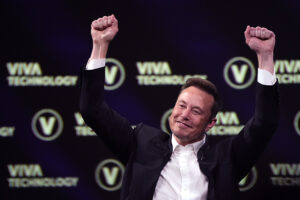
(Photo
by
Nathan
Laine/Bloomberg
via
Getty
Images)
The
question
of
whether
Elon
Musk’s
voter
registration
lottery
violates
federal
law
appears
to
be
very
much
up
in
the
air.
But
as
a
matter
of
Pennsylvania
state
law,
the
answer
appears
to
be
yes
…
probably.
Two
weeks
ago,
Musk
and
his
pro-Trump
America
PAC
promised
to
give
away
$47
“in
appreciation
for
your
support”
to
any
registered
swing
state
voter
who
signs
a
petition
“in
support
of
the
Constitution,
especially
freedom
of
speech
and
the
right
to
bear
arms.”
In
addition
Musk
promised
to
give
a
$1
million
check
to
one
signer
every
day
through
the
election.
And
notwithstanding
a
brief
pause
after
getting
a
sternly
worded
letter
from
the
Justice
Department,
he
appears
to
have
followed
through
on
the
second
part,
at
least.
It
should
be
noted
that
the
version
of
the
petition
currently
available
on
the
PAC’s
website
makes
no
guarantee
that
the
$1
million
winner
will
be
chosen
at
random.
It
should
also
be
noted
that
Musk
does
not
appear
to
have
made
the
$47
payments,
later
upped
to
$100
per
signer
in
all-important
Pennsylvania.
This
morning
Philadelphia
District
Attorney
Larry
Krasner’s
office
filed
a
two-count
civil
action
against
Musk
and
his
PAC,
charging
them
with
creating
a
public
nuisance
and
violating
Pennsylvania’s
Unfair
Trade
Practices
and
Consumer
Protection
Law.
“America
PAC
and
Musk
are
lulling
Philadelphia
citizens
–
and
others
in
the
Commonwealth
(and
other
swing
states
in
the
upcoming
election)
–
to
give
up
their
personal
identifying
information
and
make
a
political
pledge
in
exchange
for
the
chance
to
win
$1
million.
That
is
a
lottery,”
they
argue.
The
Commonwealth
does
not
permit
private
lotteries,
and
giving
away
money
to
one
randomly
selected
entrant
would
likely
violate
that
law.
Also,
as
the
complaint
points
out,
the
selection
of
winners
does
not
appear
to
have
been
random,
since
the
recipient
just
so
happened
to
be
in
attendance
at
least
three
times
now
when
the
winner
was
announced
at
a
rally.
DA
Krasner
makes
an
interesting
pincer-like
argument,
here.
Either
the
contest
is
a
lottery,
in
which
case
it
violates
the
state
ban
on
non-sanctioned
gambling.
Or
it
is not
a
lottery,
in
which
case
it
violates
the
state’s
consumer
protection
laws.
To
be
clear,
it
would
be
no
defense
for
America
PAC
and
Musk
to
argue
that
it
was
not
engaging
in
a
lottery
if
their
scheme
actually
did
not
involve
a
chance
or
random
selection
of
winners.
In
that
event,
(a)
they
would
be
admitting
to
acting
deceptively
and
in
violation
of
the
Commonwealth’s
consumer
protection
law;
and
(b)
they
would
still
be
in
violation
of
the
Commonwealth’s
prohibition
against
the
operation
of
unlawful
lotteries.
For
its
part,
the
PAC
does
appear
to
have
made
a
token
effort
to
at
least
look
like
it’s
heeding
the
lottery
ban.
In
its
current
iteration,
it
reads:
“Each
day,
one
petition
signer
from
either
PA,
GA,
NV,
AZ,
MI,
WI,
or
NC
will
earn
$1,000,000.”
And
the
rules
say
that
“Payments
of
$600
or
more
will
require
the
referrer
to
provide
a
signed
IRS
W-9
so
an
IRS
1099
can
be
issued.”
Is
Musk
thinking
he
can
magic
away
the
legal
implications
of
running
an
illegal
lottery
by
removing
the
random
selection
and
denominating
the
recipients
as
independent
contractors
earning
a
performance
bonus?
That
seems
…
poorly
thought
out.
OTOH,
we
are
talking
about
someone
who
paid
$54.20
a
share
for
Twitter
in
the
world’s
most
expensive
weed
joke
so,
yeah,
that
tracks.
Liz
Dye lives
in
Baltimore
where
she
produces
the
Law
and
Chaos substack and podcast.

